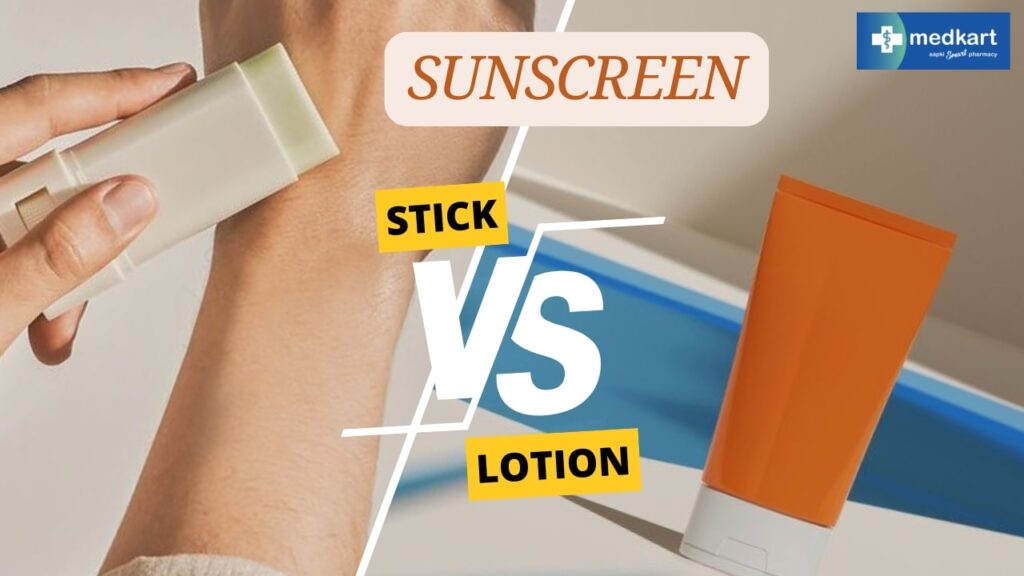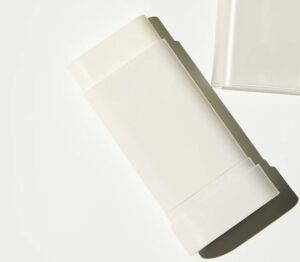Last updated on April 11th, 2025 at 01:38 pm
 Sunscreen Stick Vs Lotion – The scorching sun, while a source of warmth and light, can also pose a significant threat to our skin. With the rise in awareness of the dangers of UV radiation, sunscreen has become a non-negotiable part of skincare routines worldwide. However, the market offers an array of options, with sunscreen sticks and lotions being two popular choices.
Sunscreen Stick Vs Lotion – The scorching sun, while a source of warmth and light, can also pose a significant threat to our skin. With the rise in awareness of the dangers of UV radiation, sunscreen has become a non-negotiable part of skincare routines worldwide. However, the market offers an array of options, with sunscreen sticks and lotions being two popular choices.
Sunscreen Sticks
Sunscreen sticks are solid formulations packaged in twist-up tubes, designed for targeted application on specific areas of the skin. Composed of active ingredients like zinc oxide and titanium dioxide, they offer convenience and portability, making them ideal for on-the-go use. Their mess-free application is particularly advantageous during outdoor activities. However, sunscreen sticks may pose challenges in achieving uniform coverage on larger body areas and can leave a waxy or greasy residue. Despite these limitations, they excel in precisely targeting facial areas, scars, or tattoos. Individuals with oily or acne-prone skin often favor sunscreen sticks for their non-greasy texture and ease of application. Overall, sunscreen sticks offer a convenient solution for quick touch-ups and targeted protection, complementing other forms of sun protection in your skincare routine.
Advantages of Sunscreen Sticks
1. Portability: Convenient twist-up tubes make sunscreen sticks easy to carry and apply on the go, fitting seamlessly into pockets or bags.
2. Mess-Free Application: Their solid formulation minimizes the risk of spills or leaks, making them ideal for outdoor activities and travel.
3. Targeted Protection: Sunscreen sticks allow precise application, making it effortless to protect specific areas like the face, scars, or tattoos without spreading excess product.
4. Non-Greasy: With a lightweight texture, sunscreen sticks offer a non-greasy finish, making them suitable for individuals with oily or acne-prone skin.
5. Quick Touch-Ups: Perfect for quick touch-ups throughout the day, sunscreen sticks provide hassle-free reapplication without disrupting makeup or skincare routines.
Limitations of Sunscreen Sticks
1. Uneven Coverage: Due to their solid nature, sunscreen sticks may struggle to provide consistent coverage, particularly on larger areas of the body.
2. Residue: Some users find that sunscreen sticks leave behind a waxy or greasy residue on the skin, which can feel uncomfortable and affect the application of other skincare products.
3. Limited Application: While ideal for targeted areas like the face, scars, or tattoos, sunscreen sticks may not be practical for full-body coverage or hard-to-reach areas.
4. Potential for Missed Spots: The solid form of sunscreen sticks makes it easier to miss spots during application, leaving areas of the skin vulnerable to sun damage.
5. Less Hydration: Compared to lotions, sunscreen sticks often lack moisturizing ingredients, which may not be suitable for individuals with dry or sensitive skin.
Suitable Skin Types And Scenarios For Sunscreen Sticks
Sunscreen sticks offer unique benefits that make them particularly suitable for certain skin types and scenarios. Individuals with oily or acne-prone skin often prefer sunscreen sticks due to their non-greasy texture, which helps prevent clogged pores and breakouts. Additionally, their portability and mess-free application make them ideal for on-the-go use, making them a convenient option for outdoor activities such as hiking, swimming, or sports. Sunscreen sticks excel in targeted application, making them perfect for facial areas, scars, or tattoos that require precise coverage. Moreover, their solid formulation ensures minimal spillage, making them a preferred choice for travel or beach outings. Overall, sunscreen sticks are well-suited for those seeking quick and hassle-free sun protection, especially in scenarios where convenience and precise application are paramount.

Sunscreen Lotions
Sunscreen lotions are liquid or creamy formulations designed to provide broad-spectrum protection against harmful UV rays. Composed of active ingredients like zinc oxide and titanium dioxide, they offer versatility and ease of application. Their smooth texture allows for even coverage, making them ideal for all-over body use, including larger areas like arms, legs, and torso. Many sunscreen lotions also contain moisturizing ingredients, providing hydration while shielding the skin from the sun. However, they may require more time to apply compared to sunscreen sticks and can feel greasy or heavy on the skin, especially in hot and humid conditions. Despite these limitations, sunscreen lotions are well-suited for individuals with dry or sensitive skin and are essential for prolonged outdoor activities where full-body coverage is necessary.
Advantages of Sunscreen Lotions
1. Versatility: Suitable for all-over body application, providing comprehensive protection from UV radiation.
2. Ease of Spreading: Smooth texture ensures effortless application, ensuring even coverage without leaving patches.
3. Moisturization: Many lotions contain hydrating ingredients, nourishing the skin while offering sun protection.
4. Customizable Coverage: Easily adjust the amount applied to meet individual needs, from a light layer for daily use to a thicker layer for extended outdoor activities.
5. Compatibility: Suitable for various skin types, including dry and sensitive skin, due to their emollient-rich formulations.
6. Long-lasting Protection: Provides enduring defense against harmful UVA and UVB rays, reducing the risk of sunburn, premature aging, and skin cancer.
Limitations of Sunscreen Lotions
1. Longer Application Time: Sunscreen lotions may require more time to apply compared to other forms, especially when covering larger areas of the body.
2. Greasy Feel: In hot and humid conditions, sunscreen lotions can feel heavy or greasy on the skin, which may be uncomfortable for some individuals.
3. Potential Staining: Some sunscreen lotions may leave white residue or stain clothing and fabrics, particularly those containing high levels of zinc oxide or titanium dioxide.
4. Reapplication Challenges: Reapplying sunscreen lotions throughout the day, especially over makeup or other skincare products, can be cumbersome and may disrupt existing layers.
5. Sensitivity: Certain individuals may experience skin irritation or allergic reactions to specific ingredients commonly found in sunscreen lotions, such as fragrances or preservatives.
Suitable Skin Types And Scenarios For Sunscreen Lotions
Sunscreen lotions are ideal for individuals with dry or sensitive skin due to their moisturizing properties, providing hydration while offering sun protection. They are particularly beneficial for beach days or prolonged outdoor activities where full-body coverage is necessary. Additionally, those who prefer a smooth, easy-to-spread texture will find sunscreen lotions favorable. However, individuals with oily or acne-prone skin may find some lotions too heavy or greasy, especially in hot and humid conditions. Overall, sunscreen lotions are versatile options suitable for various skin types and scenarios, offering comprehensive protection against harmful UV rays.

Factors Influencing Choice
Several factors should be considered when choosing between sunscreen sticks and lotions:
Skin Type: Considerations for oily, dry, sensitive, or acne-prone skin.
Activity Level: Assessing the need for water-resistant or sweat-proof formulas based on your lifestyle.
Environmental Factors: Considering climate conditions and sun exposure intensity.
Personal Preferences: Texture, scent, and ease of application are subjective factors to consider.
Expert Recommendations: Insights from dermatologists or skincare specialists can help guide your decision.
In making your decision, it’s essential to weigh the pros and cons outlined above and consider your individual needs and preferences. Experimenting with different products may be necessary to find the best fit for your skin type and lifestyle. Regardless of your choice, consistent sunscreen use is crucial for long-term skin health.
Conclusion:
Sunscreen plays a pivotal role in shielding our skin from the harmful effects of UV radiation, reducing the risk of sunburn, premature aging, and skin cancer. When deciding between sunscreen sticks and lotions, understanding their differences and considering your specific requirements is key. By prioritizing sun protection and making informed choices, you can safeguard your skin and enjoy the sun responsibly.
FAQs on Sunscreen Stick Vs Lotion: Which is right for you?
1. Can sunscreen sticks provide adequate protection for larger body areas?
Answer: While sunscreen sticks offer convenience and targeted application, they may not provide as consistent coverage on larger body areas compared to lotions. It’s essential to ensure thorough application and reapplication to ensure comprehensive protection against UV rays.
2. Are sunscreen lotions suitable for oily or acne-prone skin?
Answer: Sunscreen lotions can be suitable for oily or acne-prone skin, depending on the formulation. Look for oil-free or non-comedogenic options to prevent clogging pores and minimize the risk of breakouts. However, individuals with very oily skin may find lotions too heavy, and sunscreen sticks may be a better alternative for targeted application.
3. Which option is more convenient for reapplication throughout the day?
Answer: Sunscreen sticks offer portability and mess-free application, making them convenient for quick touch-ups on the go. However, sunscreen lotions can also be easily reapplied throughout the day, especially if they come in travel-sized bottles. Ultimately, the choice depends on personal preference and lifestyle factors such as activity level and sun exposure duration.
Related Links:
Best Face Cream With Vitamin C And Suitable For All Skin Types
